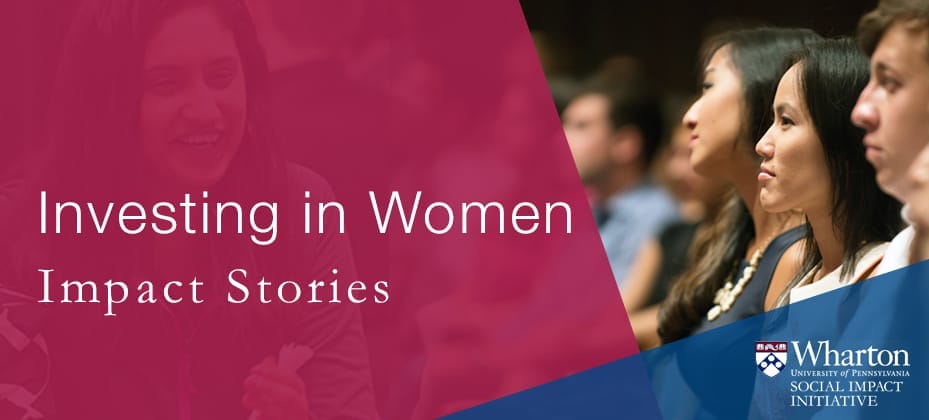The Wharton Social Impact Initiative’s Investing in Women program presents a series of interviews to introduce thought leaders and create a conversation around a more gender informed economy. They have selected individuals from across the impact spectrum—multinational companies, impact investors, social entrepreneurs, and more—to share their candid thoughts on trends, missteps, best practices, and other topics.
What’s your personal elevator pitch? In this interview, hear from a chief investment officer who suggests that “you have to sell who you are as much as you sell what you do.”
 Karen Griffith Gryga, WG’93, is not one to sit around and twiddle her thumbs.
Karen Griffith Gryga, WG’93, is not one to sit around and twiddle her thumbs.
While earning an MBA in decision analysis from The Wharton School, she was also obtaining a Masters in Computer Science from the Moore School of Engineering. She spent the next 20 years working in investing and venture capital and has since become a leader in the entrepreneurial world.
But what to do with all that experience? In 2012, she became the Managing Partner and Chief Investment Officer of DreamIt Ventures, a startup accelerator which brings in promising early-stage companies for a three to four-month program to focus on validating and de-risking business opportunities through intensive hands-on work.
Two years later, she helped create DreamIt Athena, an accelerator for female-founded startups. Today, DreamIt Athena helps women navigate industry hurdles through personalized mentoring sessions, social opportunities, and access to a deep investor network and experience.
We spoke with Karen about the issues women face in a male-led industry, the value of working toward 60 percent, and why it’s sometimes good to live with fear.
What issue or unmet need does DreamIt Athena respond to?
Women entrepreneurs are grossly underrepresented in the portfolios of angels and institutional investors. Overall, not enough women are getting funded by angels or venture capitalists. The numbers of investments do not reflect the work force, nor does it reflect the number of female entrepreneurs.
How do you think DreamIt Athena addresses that problem?
I decided to focus on four challenges that were specific to female entrepreneurs – two of them structural, two of them personality based. The two structural problems were access to capital and access to female role models. The two personality-based problems were the confidence gap and the fact that one of our strengths, multitasking, can also be our biggest weaknesses.
Throughout the program we are not only introducing specific resources, like role models or investors, but also generating awareness on some of these personality traits, which may be seen as limiting factors for women.
What issues do you think still remain in this environment?
Lack of awareness on gender bias. Google has a project on Gender Bias, which outlines these issues and shows that there is a lot of unconscious bias that may go unnoticed in the workspace. For example, NPR publicized a study that higher-registered voices instill less confidence than lower registered voices. However, the register of one’s voice is determined by physical features. Because women tend to be smaller, their voices tend to be higher. The pitch of one’s voice has nothing to do with intelligence, experience or analytical skills. Yet, there is a gender bias on this purely physical trait. If we can generate awareness around these unconscious biases, we can work to counteract it.
What lessons have you learned that you would want to share with others?
One thing that really resonated with everyone was when we discussed the “confidence gap,” which I also like to call the “bravado gap.” This was exemplified when HP developed a program to promote more women in their executive ranks, and they found that when they posted a job with ten qualifications, women applied when they met ten of the ten qualifications while men applied when they met six. My advice is to stop trying for 100 percent. Instead, I referenced the 60 percent rule – when you are 60 percent there, you go for it. Once you are out in the market, you will get feedback and direction while also gaining awareness around your goals as well as a network to support you in achieving those goals.
Besides DreamIt Athena, who else should we be watching?
I think there are a lot of people to watch. You have other organizations that have been doing a lot of work like: Springboard, which is a network of innovators, investors, and influencers who build tech companies led by women; Golden Seed, an investment firm with a focus on women-led businesses; Belle Capital, an angel fund that invests in companies with at least one female leader; and the BBG Fund, a venture fund launched by AOL focused on women-led technology start-ups.
What’s one thing we should put on our reading lists?
Entrepreneurs should read everything on sales, marketing, and product fit. But I also like First Round Review, which provides practical information from top emerging entrepreneurs about starting and growing a company. The information ranges from tech to sales to marketing to customer acquisition to employee management.
Is there any piece of advice you would share with female entrepreneurs?
Live in fear and get outside of your comfort zone. If you are not nervous or uncertain, then you are not pushing yourself hard enough. It is amazing what people can achieve when you just go for it. It is about focusing on your passion and figuring out what you need to learn and then learning it. Learn as you go and do not let the lack of knowledge hold you back.
Editor’s note: This article was originally posted on the Wharton Social Impact website as part of their Investing in Women Impact series.

























